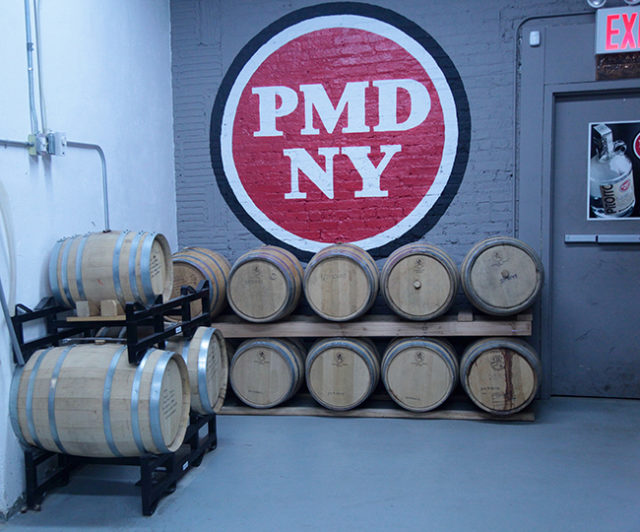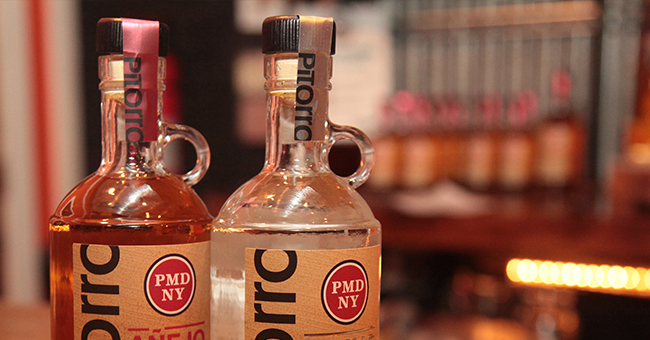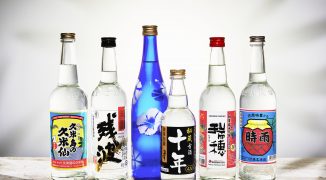My first taste of pitorro was 10 years ago, when no one was making the backyard spirit commercially. Not a drinker at the time (that changed after kids), the Puerto Rican moonshine, which I swigged in the mountains at the home of a friend of a friend, went down hard and fiery. It wasn’t just my low tolerance — at 85 to 120 proof, the stuff was rough as hell.
It was also one of the ugliest spirits I’d ever seen: a recycled rum bottle held a cloudy, debris-flecked liquid. The bootlegger, who dabbled in all sorts of illicit activities — he spurred two of his roosters to fight while we talked — explained that sugar cane or molasses form the base of pitorro, which is mixed with local fruits — coconut, guava, passion fruit, pineapple, whatever can be harvested from a tree in the yard. They’re bottled up and left to ferment, often “curing” while buried underground. When the bottle is dug up and passed around for swigging, it’s not only the dirt that sullies its look; it’s the rough-chopped fruit and bits of cane floating about, which no one bothers to filter out.
In the decade since I first tried pitorro, it’s undergone the kind of transformation that has occurred with many lesser-known local liquors as the popularity of craft spirits has soared. In 2009, the first legal pitorro distillery, Destilería Coquí, was established in Puerto Rico; by the end of 2014, it had to expand to a new facility to support the growing demand for legal hooch. Bottles of its product sat alongside more well-known Puerto Rican liquor brands, attracting the attention of tourists thanks to its high visibility in unexpected places, like Walgreens. Destilería Coquí was even exporting its seven flavors of pitorro to the United States, as well as a couple Latin American and European countries, bringing the proof down — way down — in order to do so.
It wasn’t long, however, before Destilería Coquí saw competitors entering the market. PitoRico was established in the Puerto Rican mountain town of Jayuya in late 2012, helping the spirit go even more mainstream. Big social events, like the first “Pitorro Fest,” held in 2014, confirmed that the spirit, formerly confined to backyard “stills,” was poised to hit its stride.
 The expansion of pitorro manufacturing off island made a splash in 2011, when Port Morris Distillery hung its shingle in the South Bronx. It was at PMD where childhood friends, Ralph Barbosa and Billy Valentín, Puerto Ricans who grew up in Manhattan, decided to make a Stateside version of pitorro using brown sugar, locally-grown apples, and honey.
The expansion of pitorro manufacturing off island made a splash in 2011, when Port Morris Distillery hung its shingle in the South Bronx. It was at PMD where childhood friends, Ralph Barbosa and Billy Valentín, Puerto Ricans who grew up in Manhattan, decided to make a Stateside version of pitorro using brown sugar, locally-grown apples, and honey.
But it was the expansion of pitorro manufacturing off-island that made the biggest splash, and that occurred in 2011, when Port Morris Distillery hung its shingle in the South Bronx. Childhood friends Ralph Barbosa and Billy Valentín, Puerto Ricans who grew up in Manhattan, decided to make a Stateside version of pitorro, using brown sugar, locally grown apples, and honey. They rolled the dice on the Port Morris neighborhood, which is a stone’s throw across the water from Manhattan. Despite seeming somewhat off-the-beaten path, especially for New Yorkers who rarely venture to the Bronx, the gamble already seems to be paying off. Along with the nearby Tirado Distllery, which preceded PMD, and the more recently established Bronx Brewery, PMD is pulling in hundreds of visitors a week, bartender Manny Muñoz tells me as he pours samples of the current inventory. They can take a free tour of the distillery and try small shots of pitorro; if they stick around — and most do — they can also order a pitorro-based cocktail from PMD’s bar. This pitorro only hints at the raw stuff I tried a decade ago. It’s still strong — PMD’s “Shine” is 92 proof and its añejo is no pushover, at 80 proof — but it’s also smooth, with no remnants of the traditional rough edge.
PMD isn’t the only place where legal pitorro can be had on the U.S. mainland these days; Muñoz says more than 23 bars and restaurants in and around New York City feature the spirit among their offerings, and consumers can buy bottles at more than two dozen liquor stores around the city (and, of course, at the distillery itself). Muñoz says the PMD team has worked actively to establish a toehold in the competitive spirits market, and it’s been successful doing so. It’s even attracted lots of media attention, with enthusiastic profiles in The New York Times and Edible Manhattan.
Outside New York, however, pitorro remains a bit obscure, known primarily among spirits devotees who are always looking for the next big thing. Ori Geshury, Director of Education at Philadelphia’s Aqua Vitae Institute, learned about pitorro through PMD and was intrigued immediately. “It’s similar to how I learned about Sorel,” he says. “American entrepreneurs take something from their heritage and give the cocktail community a new ingredient to use.” Geshury, who has visited PMD, says he loves how transparent the distillery is; “You can walk in and see everything they’re doing!”
tBut Geshury’s enthusiasm about introducing pitorro to Philadelphia is curbed a bit by the fact that it’s not yet legal in Pennsylvania. “Unfortunately, the process for getting a spirit approved for sale in Pennsylvania can take years of focused effort for smaller distillers like PMD,” he explains. For now, Geshury has to satisfy himself with experimenting with the spirit at home. “My favorite combination so far has been to shake pitorro together with a homemade shrub — sweet habaneros with pitorro or my own special berry basil shrub.” But he’s intrigued by some other possibilities. Geshury has listened to Puerto Ricans’ memories of pitorro from the island, including tales of infusing pitorro with meat or shellfish. “That kind of thing really stretches my imagination in what is possible with cocktails and really humbles me about how much more I could possibly learn,” he says.





